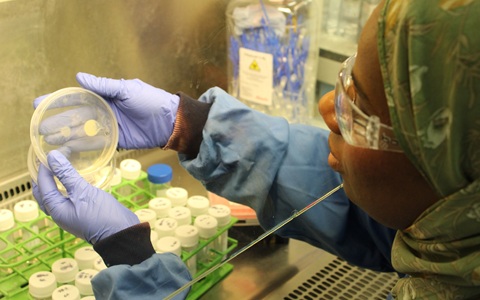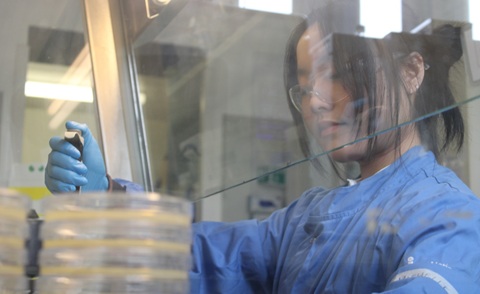Recent News 28 : Take part today in the discovery of new phages
Researchers enlist the public as citizen scientists at national exhibition Investigating bacterial samples taken from cystic fibrosis patients
Investigating bacterial samples taken from cystic fibrosis patients
Researchers at the University of Southampton are asking the public to become citizen scientists in the fight against antibiotic resistance.
At the Royal Society Summer Science Exhibition , which opens to the public on Wednesday 2 July in London, visitors will be invited to help find phages – tiny viruses that could be key to combating antimicrobial resistance (AMR).
At their exhibit, the Southampton scientists will ask people to collect and send water samples from their homes, local parks or rivers, or even their toilets.
These samples will be analysed by researchers on the hunt for phages that could help fight resistant bacterial infections.
The World Health Organization identifies AMR as one of the top global public health threats, estimated in 20221 to be directly responsible for over one million global deaths per year, and contributing to over 4.7 million deaths per year.
Dr Franklin Nobrega, Associate Professor in Microbiology at the University of Southampton and lead researcher on the project, said: “The threat of antimicrobial resistance grows year on year, and we urgently need to find alternative treatments to reduce our reliance on antibiotics. Phages have enormous potential. They are everywhere and can provide incredibly precise, targeted treatments for resistant infections.”
The promise of phages
When bacteria become resistant to antibiotics, infections become harder to treat. AMR threatens the safety of a wide range of medical procedures, from chemotherapy and organ transplants to tooth extractions, because even minor infections resulting from these interventions can become life-threatening without effective antibiotics.

Phages present a promising alternative. Unlike antibiotics, they are highly specific, targeting harmful bacteria without affecting healthy microbes.
Phages also multiply at the site of infection, providing continuous, focused treatment until the bacteria are eradicated. This self-amplifying ability could make phage therapy a sustainable and efficient solution for tackling resistant infections.
In the UK, phages can now be used under existing regulatory routes for unlicensed treatments in individual patients, and new guidance from the Medicines and Healthcare products Regulatory Agency (MHRA) aims to accelerate the safe development of licensed phage-based medicines for wider clinical use.
Phage therapy has already been used in the UK and globally to treat patients with life-threatening, antibiotic-resistant infections, including bone infections, sepsis, and cystic fibrosis-related infections.
Dr Nobrega said: “We know that phage therapy can be effective in treating resistant infections. However, there are billions of different phages, each targeting a specific microbe. By finding more of these phages, we can improve our chances of beating AMR. In this arms race against resistant bacteria, every new phage we discover adds a valuable weapon to our arsenal.”
Free sampling kits
Over 500 visitors to the Summer Science Exhibition will be provided with free sampling kits.
Prior to posting the water sample back to Southampton for analysis, participants will be asked to name their phage (in the hope the scientists isolate a phage from their sample) and upload the coordinates of where their sample was taken to the project website .
Once the researchers have the samples collected by the public, their next step will be to determine if any of the 500+ citizen scientist samples contain therapeutically relevant phages.
Participants will be able to track the progress of their own sample, and the overall findings, on the project website .
Visitors to the Summer Science Exhibition will also be able to meet the researchers, take part in a VR experience that explains how to apply phage therapy therapeutically, and build their own Lego model of a phage.
The Summer Science Exhibition is open to the public at the Royal Society, 6-9 Carlton House Terrace, London SW1Y 5AG from Wednesday 2 July to Sunday 6 July 2025.
Resources : Copyright, https://www.southampton.ac.uk/news/2025/06/researchers-enlist-the-public-as-citizen-scientists-at-national-exhibition.page
.png)

.png)
already sent a sample from my loo xd, hope it will help scientists :)
ReplyDelete